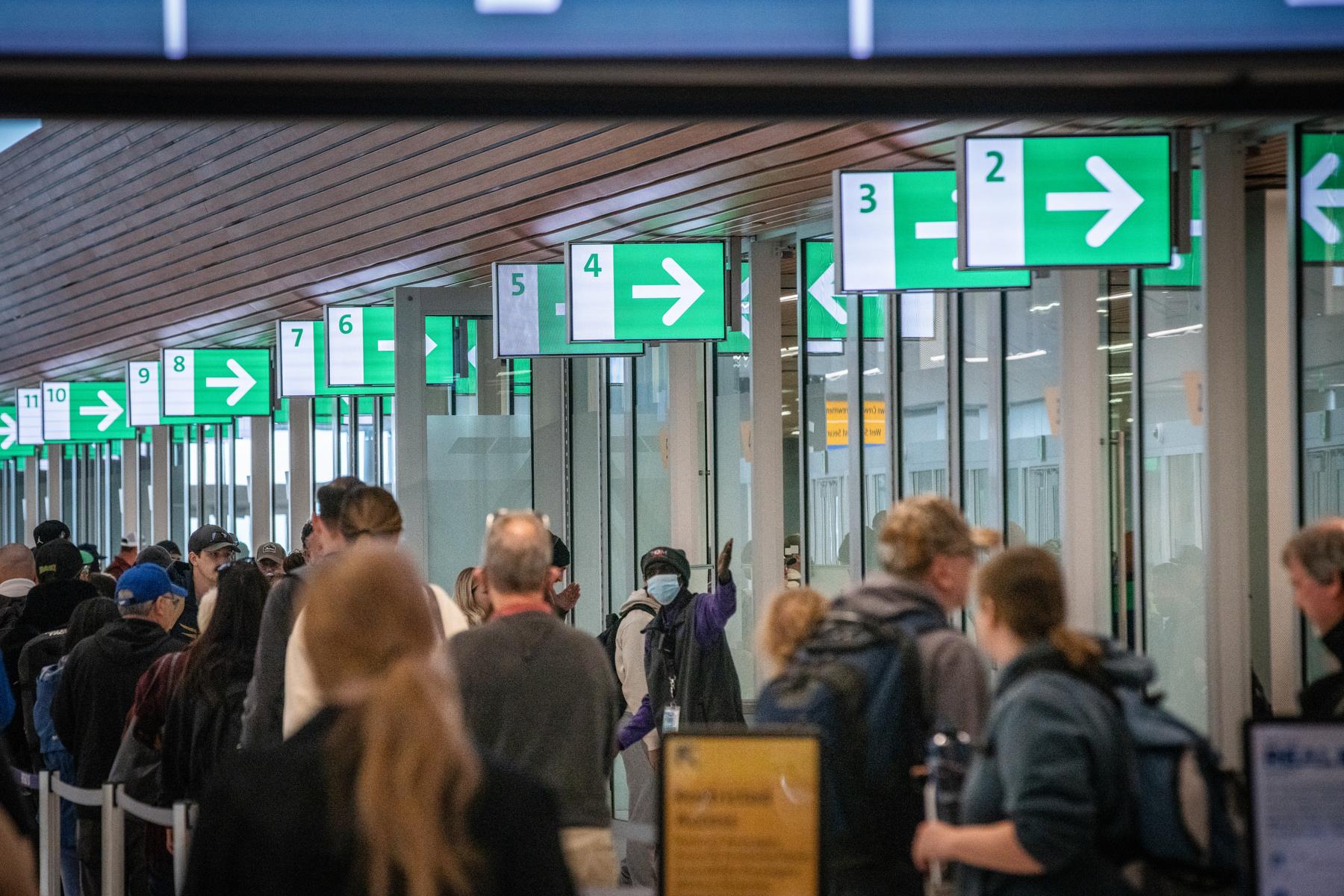
Denver resident Alex Parks is set to watch his cousin get married in Phoenix this weekend. Parks, his partner and brother were planning to fly out of Denver International Airport on Friday night.
But they had a nagging feeling that their flight could be caught up in the Federal Aviation Administration’s order to reduce commercial flights across the nation by 10 percent due to the federal government shutdown.
“A couple days ago, we were like, ‘Oh, this is crazy. We might not get to fly, we might have to drive,’” Parks said. “So we started making plans as a contingency.”
And sure enough, 36 hours before his trip, Frontier announced that their departing and returning flights would be canceled. They would have to add two days to their trip to make the almost 13-hour drive to Arizona. He was one of hundreds of travelers affected by the flight cancellations, which are expected to continue over the weekend and worsen if the shutdown lasts through next week.
“And if we had planned it out, I would've been like, ‘I'll take a few days off, and we can make it a fun road trip,’” Parks said. For other family members, it’s far more nerve-wracking.
“They're still not sure if their flight has been canceled or not. Last I heard, they hadn't heard anything,” he said. “I think they're just kind of planning on proceeding.”
As of 4 p.m. on Friday, there were 74 flight cancellations and 254 flight delays in and out of Denver International Airport.
Airlines are quickly adjusting as well
As of Friday, United canceled around 4 percent of its flights in Denver, a total of 21 flights, according to Jonna McGrath, the vice president of airport operations in Denver for United Airlines.
DIA is United’s largest hub.
United and other airlines are generally trying to maintain routes between their hubs and other large cities as well as international flights. But regional routes to smaller markets are most likely to get cut to meet the FAA’s request.
“For example, like Colorado Springs, we run 12 flights a day. (Now) we're running eight flights a day,” McGrath said.
She said the airline’s cuts account for whether people can take other modes of transportation instead. Colorado Springs is a roughly 90-minute drive from Denver.
The Colorado Springs Airport didn’t immediately respond to a request for comment.
McGrath compared 21 flights to a minor snowstorm. She said during medium snowstorms, United will cancel around 50 flights. But the shutdown is unique because it is manmade, with the same impacts repeating daily for an indefinite amount of time.
“We are canceling a little bit of our mainline and our commuter traffic. It's about 50-50 here in Denver,” she said, referring to the mix of longer and regional flights.
According to McGrath, if the government is still closed by next Friday, United will have to cancel 10 percent of its flights.
“We're a very complex operation at the airlines. We have the aircraft routing, the maintenance schedules, the crew routings, both flight attendants and pilots,” McGrath said. “So it does become complicated, but we have done a great job of leveraging technology to be able to figure out what is the least impactful to the overall operation to be able to still provide that great service to our customers.”
Smaller regional airports, while not on the FAA’s list for cancellations, might still feel the fallout, especially if flights from larger hubs are canceled.
“We’re keeping an eye on the situation and staying in touch with the FAA and tower here at RMMA,” wrote a Rocky Mountain Metropolitan Airport spokesperson via email. “Right now, we don’t expect any direct impact on our operations, but if that changes, we’ll be sure to let people know.”
DIA trying to pay its workers
Air Traffic Controllers (ATC) and Transportation Security Administration (TSA) employees have been working through the shutdown without pay. On Wednesday, DIA submitted an emergency waiver to the FAA to allow them to pay their ATC employees during the shutdown with airport revenue. They would then request a reimbursement from the federal government at the end of the shutdown.
It is unclear if or when the FAA would approve the waiver.
On Friday morning, Democratic leaders from Colorado called on the FAA to approve of DIA’s emergency request.
“[Denver] has provided a commonsense proposal that provides a temporary lifeline to the very people ensuring the safety of our skies. Given the urgency of this situation, which now directly affects airports across the country, we urge your immediate approval of this request,” wrote the Colorado lawmakers.
The letter was signed by U.S. Sens. John Hickenlooper and Michael Bennet as well as Reps. Diana DeGette and Jason Crow, who both represent the airport in their districts. Reps. Joe Neguse and Brittany Pettersen also supported the call to action.








